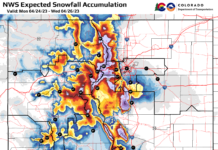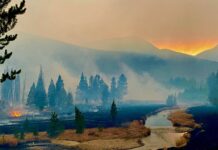by Marissa Lorenz
In the few short months that Kevin Ratzmann has served as the Chief of Grand Lake Fire Protection District (GLFPD), he has not hesitated to take action within the organization, implementing rapid changes in areas of opportunity, including more rigorous training/hiring requirements and the purchase of vehicles and equipment that will enable the agency to move from a fire and basic medical support team to a fully-qualified and licensed Advanced Life Support provider and emergency transporter.
“We want to assist in filling the gaps that currently exist [in the countywide emergency response services],” stated Ratzmann. “I live here. My family is a part of this community. I want it to have the safest response system possible.”
Coming from La Plata County, where he served as deputy chief of the Los Pinos Fire Protection District and chair of the La Plata County Emergency Medical Services Council, Ratzmann is a Florida native and military veteran. His decades as a professional firefighter, wildland fire experience, and service as a combat medic in Afghanistan all played into his enthusiastic selection as chief by the GLFPD Board in January of this year. And their faith in his ability to lead the organization does not seem to have been misplaced.
Already, Ratzmann has increased the qualifications and capabilities of his staff and agency, through additional trainings, new hiring guidelines and programs, and the upgrading of resources. In the past three months, he has strengthened the marine rescue capability of the agency and put together a complete wildland response team, employing 5 new wildland professionals. He purchased snowmobiles and equipment through the District and is working in agreement with Rocky Mountain National Park to provide backcountry rescue.
The District now has a residency program, offering housing and professional education for new trainees in exchange for eight 24-hour shifts each month. And all staff are now dual- certified with EMT or paramedic medical certification in addition to their firefighter certifications. This last will continue to be a requirement for new hires, as it allows the entity to function as an Advanced Life Support (ALS) agency, an important capability in Ratzmann’s estimation. An ALS designation means that, if the agency is the first on the scene of a medical incident, in addition to offering basic life support, such as blood pressure monitoring and oxygen delivery, they would also be able to provide more urgent services, like cardiac monitoring, IV therapy, and advanced medications.
To support the new skills of his staff and co-workers, Ratzmann has just purchased two ambulances and spent upwards of $200,000 on outfitting them with heart monitors, defibrillators, and more. “Grand Lake does not have a dedicated ambulance,” he explained. For though the Grand County Emergency Medical Services Department leases a bay at the Grand Lake Fire Station for a county-owned ambulance, Ratzmann says the ambulance is only actually in the Grand Lake community about 20% of the time. “We have an older population in Grand Lake,” he stressed, “and a large area of coverage, from around mile marker 5 on Highway 34 all the way up into the National Park.” And “while the average response time from Granby to Grand Lake is 17 minutes, we are on the road within 60 seconds.”
Besides proximity, Ratzmann explains that this capability (and others) is very much due to the fact that the Grand Lake Fire Protection District is the only paid career fire protection district in the county. East Grand Fire, Grand Fire, Hot Sulphur-Parshall Fire, and Kremmling Fire districts are all primarily dependent on volunteer staff, meaning that, in the case of a call-out, an on-call volunteer may have to travel from their home or work to reach their fire station. “We are a career agency with resources the other districts don’t always have. We are dedicated to continuing to improve our service to the county.”
For their part, Grand County EMS is “hoping for a collaborative effort in continuing to evolve the level of care to the Grand Lake community,” according to Ray Jennings, Chief of Grand County EMS and Director of Emergency Management. GLFPD’s purchase of the emergency response equipment, he said, “will definitely enhance their capability in response and Advanced Life Support care, while waiting for transport by Grand County EMS. It’s nice to see them grow and enhance their services in Grand Lake.”
In a recent update to the Grand County Board of County Commissioners, Chief Jennings introduced data indicating that the countywide average EMS response rate was actually down significantly, with a current average response rate of about 10 minutes, compared to 13 minutes in 2018. “However, we do get busy at different times,” he admitted. “We’re using different resource allocation and want to constantly improve our own response time and patient care.”
As for the Grand Lake Fire Protection District, they are riding a wave of energy, hoping to press their agency even further into the forefront of emergency response in the county. Ratzmann has already applied to the County for a transport license so that, in addition to responding to emergencies and non-emergencies alike, his crews would also be able to transport patients to hospital care as well. He will meet with County staff on June 24, and hopes to come to an interagency agreement with the Grand County Sheriff’s Office and GC EMS on cooperative response and transport.
The District already has new agreements with the Hot Sulphur Springs Parshall Fire Protection District (HSSPFPD) and Middle Park Health (MPH) to enhance and complement the roles each plays in our greater Grand County community. Grand Lake FPD and Hot Sulphur-Parshall FPDs are working together on policy and procedure and are both now working with Dr. Paulsen of Middle Park Health, who is serving as medical director to each. And Middle Park Health is funding a brand new shared clinical paramedic position, that will be based out of the new Grand Lake MPH Clinic but will be available to act as an emergency responder as well.
Other funds for recent programs and purchases have come from the Grand Lake FPD itself, and Chief Ratzmann praises his Board for not only being very supportive now but for having been fiscally responsible in the past, in order to enable the current growth and change. Other more recent monies have come from the federal government for the District’s wildland fire team. “There’s a lot of federal dollars available for wildland fire right now,” Ratzmann explains. “We’re currently bringing in $16,000 every two weeks for our Wildland Team and there is nearly unlimited support for those activities.” However, he is aware of the need for continued attentiveness to funding needs and opportunities.
“We want to keep growing our staff and services, and look to provide more jobs and community benefits even within the next 6 months,” says Chief Ratzmann. “We need to keep trying to create new funding streams to do that.”
The greater Grand community will certainly watch and hope for a success that may provide a new model for emergency service growth and efficiency for all of our towns.









